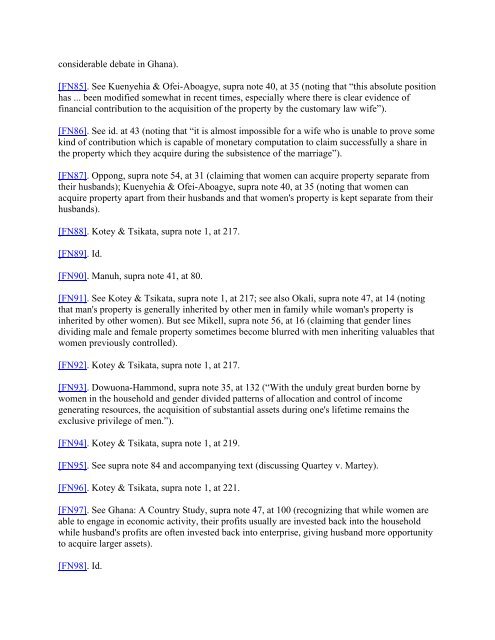Law, Culture and Women's Inheritance Rights in ... - Leitner Center
Law, Culture and Women's Inheritance Rights in ... - Leitner Center
Law, Culture and Women's Inheritance Rights in ... - Leitner Center
You also want an ePaper? Increase the reach of your titles
YUMPU automatically turns print PDFs into web optimized ePapers that Google loves.
considerable debate <strong>in</strong> Ghana).<br />
[FN85]. See Kuenyehia & Ofei-Aboagye, supra note 40, at 35 (not<strong>in</strong>g that “this absolute position<br />
has ... been modified somewhat <strong>in</strong> recent times, especially where there is clear evidence of<br />
f<strong>in</strong>ancial contribution to the acquisition of the property by the customary law wife”).<br />
[FN86]. See id. at 43 (not<strong>in</strong>g that “it is almost impossible for a wife who is unable to prove some<br />
k<strong>in</strong>d of contribution which is capable of monetary computation to claim successfully a share <strong>in</strong><br />
the property which they acquire dur<strong>in</strong>g the subsistence of the marriage”).<br />
[FN87]. Oppong, supra note 54, at 31 (claim<strong>in</strong>g that women can acquire property separate from<br />
their husb<strong>and</strong>s); Kuenyehia & Ofei-Aboagye, supra note 40, at 35 (not<strong>in</strong>g that women can<br />
acquire property apart from their husb<strong>and</strong>s <strong>and</strong> that women's property is kept separate from their<br />
husb<strong>and</strong>s).<br />
[FN88]. Kotey & Tsikata, supra note 1, at 217.<br />
[FN89]. Id.<br />
[FN90]. Manuh, supra note 41, at 80.<br />
[FN91]. See Kotey & Tsikata, supra note 1, at 217; see also Okali, supra note 47, at 14 (not<strong>in</strong>g<br />
that man's property is generally <strong>in</strong>herited by other men <strong>in</strong> family while woman's property is<br />
<strong>in</strong>herited by other women). But see Mikell, supra note 56, at 16 (claim<strong>in</strong>g that gender l<strong>in</strong>es<br />
divid<strong>in</strong>g male <strong>and</strong> female property sometimes become blurred with men <strong>in</strong>herit<strong>in</strong>g valuables that<br />
women previously controlled).<br />
[FN92]. Kotey & Tsikata, supra note 1, at 217.<br />
[FN93]. Dowuona-Hammond, supra note 35, at 132 (“With the unduly great burden borne by<br />
women <strong>in</strong> the household <strong>and</strong> gender divided patterns of allocation <strong>and</strong> control of <strong>in</strong>come<br />
generat<strong>in</strong>g resources, the acquisition of substantial assets dur<strong>in</strong>g one's lifetime rema<strong>in</strong>s the<br />
exclusive privilege of men.”).<br />
[FN94]. Kotey & Tsikata, supra note 1, at 219.<br />
[FN95]. See supra note 84 <strong>and</strong> accompany<strong>in</strong>g text (discuss<strong>in</strong>g Quartey v. Martey).<br />
[FN96]. Kotey & Tsikata, supra note 1, at 221.<br />
[FN97]. See Ghana: A Country Study, supra note 47, at 100 (recogniz<strong>in</strong>g that while women are<br />
able to engage <strong>in</strong> economic activity, their profits usually are <strong>in</strong>vested back <strong>in</strong>to the household<br />
while husb<strong>and</strong>'s profits are often <strong>in</strong>vested back <strong>in</strong>to enterprise, giv<strong>in</strong>g husb<strong>and</strong> more opportunity<br />
to acquire larger assets).<br />
[FN98]. Id.


